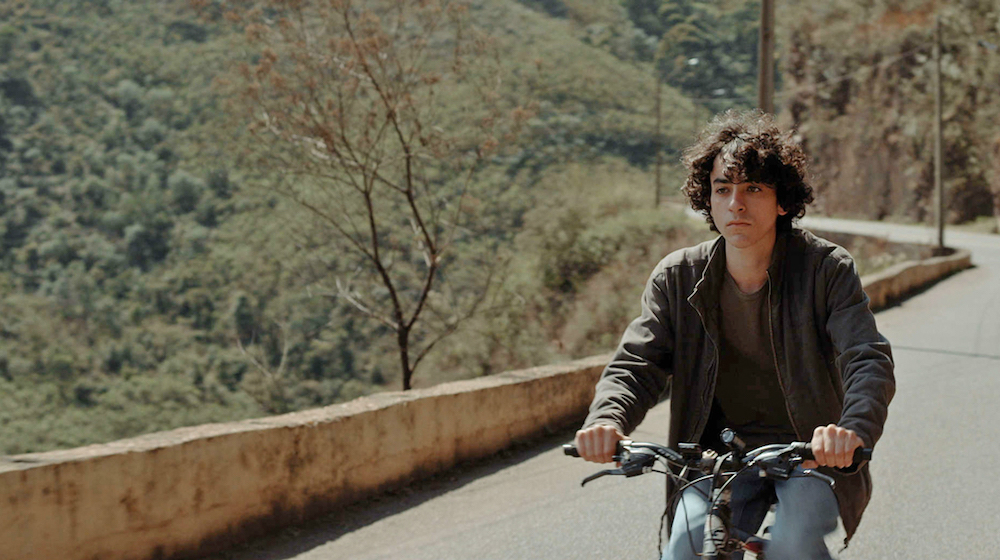In the opening scene of Araby, a young boy named André rides a bike along a bucolic back road in Ouro Preto, a small town in the heart of one of Brazil’s major industrial states, Minas Gerais. At first, the movie, directed and written by Affonso Uchoa and João Dumans, seems to hew closely to its titular inspiration of “Araby,” the vastly influential short story from James Joyce’s seminal collection, Dubliners. In the film, André’s parents are absent, and we watch him take care of his sick brother with the help of his aunt, Márcia, who is a nurse. In both, a young boy is coming of age in a sleepy neighborhood, and the film primes itself to follow Joyce’s narrative: a boy has his first unrequited love with a girl, followed by a quiet disillusionment.
But Araby instead takes a strange turn: a worker at the neighborhood factory, Cristiano, suffers an accident and is transported to the hospital. André goes to Cristiano’s house to retrieve some of Cristiano’s essentials. There, André finds a journal, and the proper story begins. André vanishes and Cristiano’s memories — in the form of a voiceover — take control, transforming the film into a road movie that follows Cristiano’s itinerant life as a laborer. He spends time in prison for a failed car robbery, finds work as an unpaid fruit picker, a road laborer, a contractor, a textile maker, and a steelworker in a factory in Ouro Preto. There is a red herring about the title, when several men from the road crew are sitting around smoking and listening to a joke about several Arabs migrating to Brazil, but otherwise the title is never directly referenced. As Cristiano’s story wanders toward the present day, and toward his unexplained industrial accident, the meaning of the title, James Joyce, and “Araby” drift further and further out of view.
So why did Uchoa and Dumans decide to name their film after one of Joyce’s most iconic stories and one of the most influential short stories in the English language? In an interview with the Brazilian newspaper Estadão, Uchoa references the influence of Joyce and Dubliners:
The discovery of Dubliners was, for us, very important because it crystallized an anxiety that all of us were feeling, a search that we had already embarked on. Joyce approached the universe of the proletariat in his narratives in Dubliners. This is where the plot came from, and it was an inspiration that we were already searching for. Araby grew out of our fascination with the working-class neighborhoods of Ouro Preto.
At first, Uchoa and Dumans’s movie was supposed to be a short film and a closer adaptation of Joyce’s “Araby,” but after eight years of writing and revising only the title remained. The influence of short story is more keenly felt in the mood and sentiment of a film focused on the “common man.” As Cristiano says, “I’m like anybody else. It’s just my life that was a little bit different.” Ouro Preto, where Cristiano finds employment at the steelworks, is in fact a UNESCO World Heritage site, known for its picturesque views and colonial buildings from Brazil’s gold rush era. Yet, the film is divorced from the town’s beauty and history — only showing the hardscrabble life of the Brazilians living in the nearby Bairro Operário, the factory neighborhood, perhaps not so different from North Richmond Street, the setting of Joyce’s “Araby.”
Like Dubliners’ depiction of average life for the 20th century Irish, Araby stands out for its heartfelt portrayal of marginalized life in Brazil, something that rarely makes it into Brazilian film or television. Araby stands out especially when compared to the country’s most famous film, City of God (2002). The two movies appear in stark contrast to each other. City of God shows the Brazil familiar to the outside world: sweeping vistas of Rio de Janeiro, life in the tight-knit favelas, a tale of ambition, drugs, and violence — surely a narrow reality for a country of 208 million people. Aiming for authenticity, Uchoa and Dumans asked the actor who played Cristiano, Aristides de Sousa, who, like his character, spent time working as a laborer, to help write parts of the film by keeping a notebook, just like Cristiano. In addition to Joyce, Uchoa and Dumans were influenced by Brazilian authors who wrote of the country’s down-and-out peoples: João Antônio, Oswaldo França Jr., and Graciliano Ramos. Ramos’s classic novel, Barren Lives (Vidas Secas), is a circular story of hope and despair that tells the story of a destitute family of workers traveling the drought-ridden backcountry of the sertão.
Both “Araby” and Araby are stories about a journey. In the short story, the journey is encompassed by a train ride: “I took my seat in a third-class carriage of a deserted train. After an intolerable delay the train moved out of the station slowly. It crept onward among ruinous houses and over the twinkling river.” Joyce’s description could neatly fit in as part of Cristiano’s voiceover in Araby as well. Near the end of the film, Cristiano experiences the most Joycean of moments — an epiphany. While working in the steelworks of Ouro Preto, he suddenly stops hearing the noise of the factory. He only hears his heartbeat and takes in the horror of the factory. It feels as if he were waking from a nightmare, and he has the insurmountable urge to go home, not just for himself but for all of them, the workers and the supervisors, to finally return home. Perhaps, like in Joyce’s story, Cristiano’s eyes “burned with anguish and anger.”


